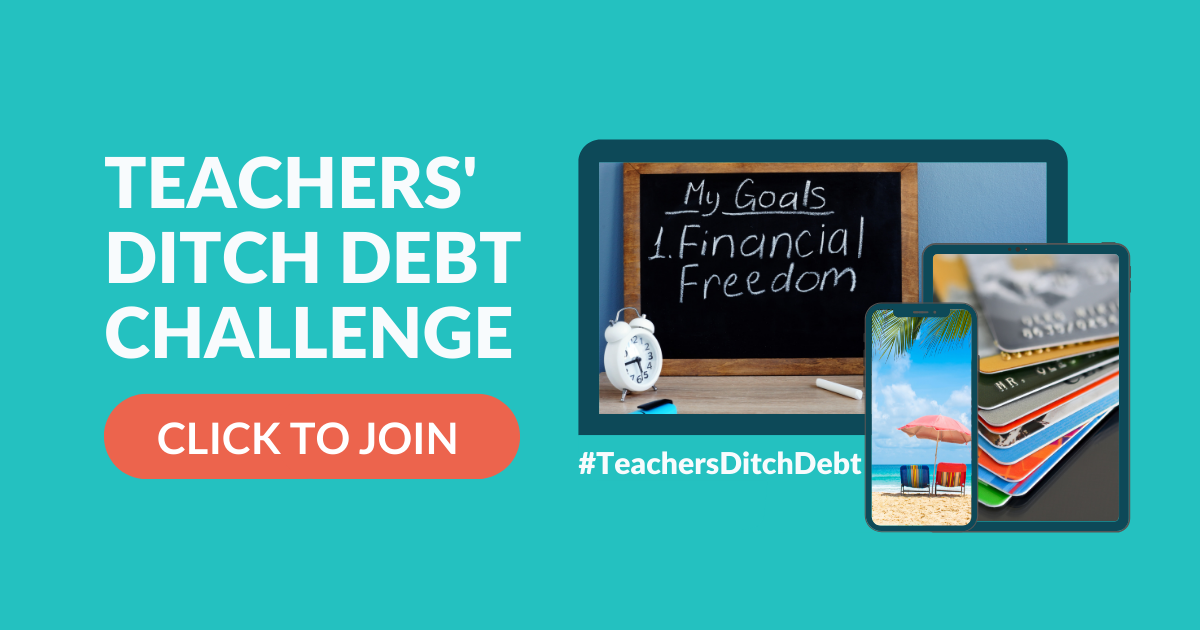Take a course!
- identify the money blocks that are holding you back
- implement simple systems to pay off debt & build savings
- banish guilt, reduce stress and FEEL GREAT about money
For some teachers financial planning is way down their list of priorities. However, it is something that is really vital both for the future and the here and now. I believe that focusing more on financial wellbeing will also improve teacher wellbeing. Improved financial wellbeing gives you more freedom and choice as well as more peace of mind and joy in the present and in the future. That's got to be a good thing, doesn't it?
I will share some steps that you could take to improve your financial planning and improve your future.
Step One: Find support.
This is so important because we really need to find the people who are going to cheer us on in our journey. If you're going to be successful in creating financial security for you and your family, then it is helpful if the people around you do understand and do support you. If you would like some extra support, then join my free Your Money Sorted for Teachers group on Facebook.
Step Two: Set yourself some massive goals
Take some time out to have a think about what it is that you really want out of life. They say that people who set goals are 42% more likely to achieve those goals so it's really important to create these goals to remind yourself of them every day so we can have wee reminders up around the house.
For example, I want to have a camper van, leave teaching and go traveling for a year when I'm 55. I've got lots of wee reminders of that all over the house and that just reminds me every day that everything that I do is working towards achieving that goal.

Step Three: Create a small emergency fund
This is part of the method that is recommended by Dave Ramsey, who talks about the Baby Steps to Wealth. My steps are adjusted to suit teachers. In your journey to financial security, emergencies happen and these things can really derail us and can make us feel a bit insecure and can lead us to take on debt. To help avoid this it's really important that you start to save a small emergency fund.
If you have nothing saved for emergencies then you should be aiming for a small emergency fund of £1000. If you would like some tips about how to save this easily, then you can get started here.
Step Four: Pay off all consumer debt
If you have any consumer debt, credit cards, loans, payday loans, buy now pay now later, you should start to think about getting this paid off. All these things are costing you a fortune, both emotionally and actually physically in cash. This might seem impossible but once you get started on the journey, it actually becomes easier than you might think.
We are going to be keeping a running total of all the debt that we pay off during the year, so I think that will be pretty motivating to see the total at the end of the year. After just one month the total debt paid off is sitting at just under £25,000!
Step Five: Create a three to six months emergency fund
Once you have all your debts paid off the next step is to create an emergency fund with 3-6 months of essential expenses. The easiest way to work this out is to simply sit with the bank statement, look through all your regular payments and work out which ones you absolutely have to pay each month and which ones you could do without. That will then allow you to work out exactly how much you would need each month to payout.
The benefit of this is that you can withstand most emergencies so you know that you still have a roof over your head, you'll still be able to pay the important bills and still be able to feed you and your family, regardless of what's going on.

Step Six: Think about your retirement plan
Most teachers start paying into a pension when they start their teaching career. If you have done that, then that places you in good stead. Have a look at your pension and work out how much it is going to pay out and at what age. In Scotland, it's currently at 67 but if my state pension does go up to 68, then it will be 68 before I can get my full teacher's pension as well. Now that doesn't mean that I need to stay in teaching until I'm 68 because I can access my pension before that, but what it does mean is I won't get my full teaching pension until the age of 68.
This is why it's really important that we become aware of these facts and work out exactly when and what we are due. For teachers financial planning can be something that gets left to one side, because life is so busy. However, at this stage, it's important to check your teaching pension and decide what age you do want to retire at, then start thinking about what else you can put into place to allow you to retire when you want on the income you want.
Step Seven: Plan for the future
Think about the important milestones that are going to happen in the future. Do you want to help your children through uni? Do you want to help them with a house deposit? Do you want to perhaps move house? Do you want to travel?
Whatever it is that you want to do in the future, it's now a case of starting to think about what you want and how you're going to financially achieve that without taking on extra debt throughout your life. It may seem like this is just impossible, but just taking it one step at a time and concentrating only on that step will really help you to make progress much, much more quickly than you could ever imagine.
Teachers financial planning
Starting the financial planning process now will stand you in good stead for the rest of your life. Teachers financial planning doesn't have to be scary or difficult. By following the steps above you will get a good headstart.
The benefits of doing this are just massive. We can stop living payday to payday. We can stop worrying about money and we can start living our best lives while knowing that we've got that backup and that financial security that is going to keep us safe, secure, and still allow us to do what we want.
You might also enjoy listening to the podcast episode about creating financial security on a teaching salary.
Hi, I’m Eileen Adamson, money coach, empowering professional women to become happier, healthier and wealthier. By showing you how to make small, sustainable changes, I can help you create the financial security and freedom you deserve.










